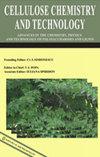EFFECT OF NATURAL DYES AND DIFFERENT MORDANT TREATMENTS ON ULTRA-VIOLET PROTECTION PROPERTY OF COTTON FABRIC
IF 1.1
4区 农林科学
Q2 MATERIALS SCIENCE, PAPER & WOOD
Cellulose Chemistry and Technology
Pub Date : 2023-09-29
DOI:10.35812/cellulosechemtechnol.2023.57.77
引用次数: 0
Abstract
Natural dyes are eco-friendly, skin-friendly, have pleasing colours and other beneficial characteristics, such as UV protection property. In the present work, different natural dyes (onion skin, henna leaves, curry leaves, neem leaves and turmeric), along with a number of mordants (myrobalan, alum, ferrous sulphate and ferrous sulhate-myrobalan), were used to study their effects on colour strength and the ultraviolet protection factor (UPF) values of treated dyed cotton fabric. It was found that the highest colour strength (K/S) was achieved on ferrous sulphate-myrobalan treated turmeric dyed cotton fabric (75.45), followed by the samples dyed with onion skin (48.24), henna leaves (37.40), neem leaves (28.61) and curry leaves (25.96). The highest UPF value was found for ferrous sulphate-myrobalan pretreated curry leaves dyed cotton fabric (27.69), which indicated very good protection, whereas the ferrous sulphate-myrobalan pretreated onion skin dyed cotton fabric showed good protection (23.39), followed by those dyed with henna leaves (21.79), turmeric (19.48), and neem leaves (16.43).天然染料及不同媒染剂处理对棉织物紫外线防护性能的影响
天然染料是环保的,亲肤的,具有令人愉悦的颜色和其他有益的特性,如紫外线防护性能。在本工作中,使用不同的天然染料(洋葱皮、指甲花叶、咖喱叶、印度楝叶和姜黄),以及一些媒染剂(myrobalan、明矾、硫酸亚铁和硫酸亚铁-myrobalan),研究了它们对染色棉织物的颜色强度和紫外线防护系数(UPF)值的影响。结果表明,硫酸亚铁-myrobalan染色棉织物的色强(K/S)最高(75.45),其次是洋葱皮染色(48.24)、指甲花染色(37.40)、印楝叶染色(28.61)和咖喱叶染色(25.96)。硫酸亚铁-密罗巴兰预处理的咖喱叶染色棉织物UPF值最高(27.69),保护效果较好;硫酸亚铁-密罗巴兰预处理的洋葱皮染色棉织物UPF值为23.39),其次是指甲花叶(21.79)、姜黄叶(19.48)和印楝叶(16.43)。
本文章由计算机程序翻译,如有差异,请以英文原文为准。
求助全文
约1分钟内获得全文
求助全文
来源期刊

Cellulose Chemistry and Technology
工程技术-材料科学:纸与木材
CiteScore
2.30
自引率
23.10%
发文量
81
审稿时长
7.3 months
期刊介绍:
Cellulose Chemistry and Technology covers the study and exploitation of the industrial applications of carbohydrate polymers in areas such as food, textiles, paper, wood, adhesives, pharmaceuticals, oil field applications and industrial chemistry.
Topics include:
• studies of structure and properties
• biological and industrial development
• analytical methods
• chemical and microbiological modifications
• interactions with other materials
 求助内容:
求助内容: 应助结果提醒方式:
应助结果提醒方式:


